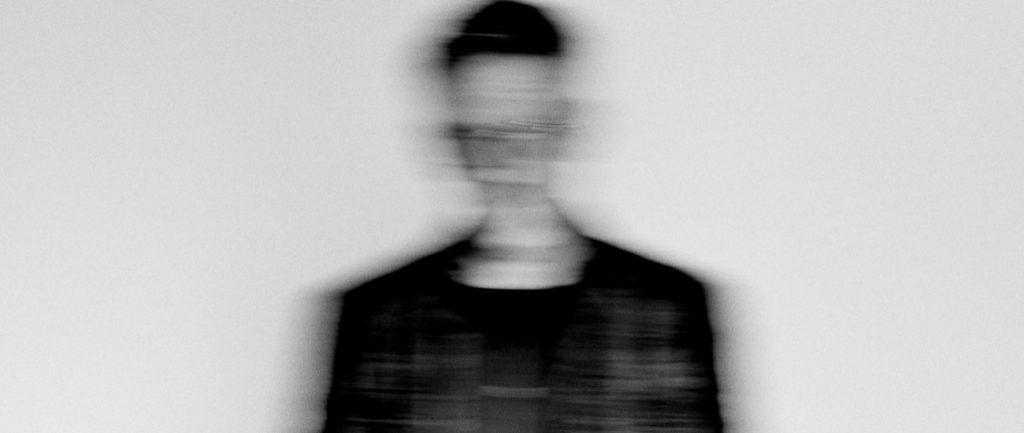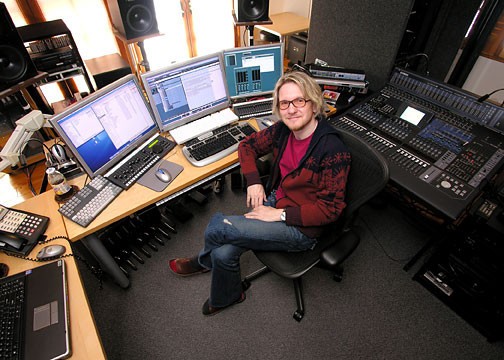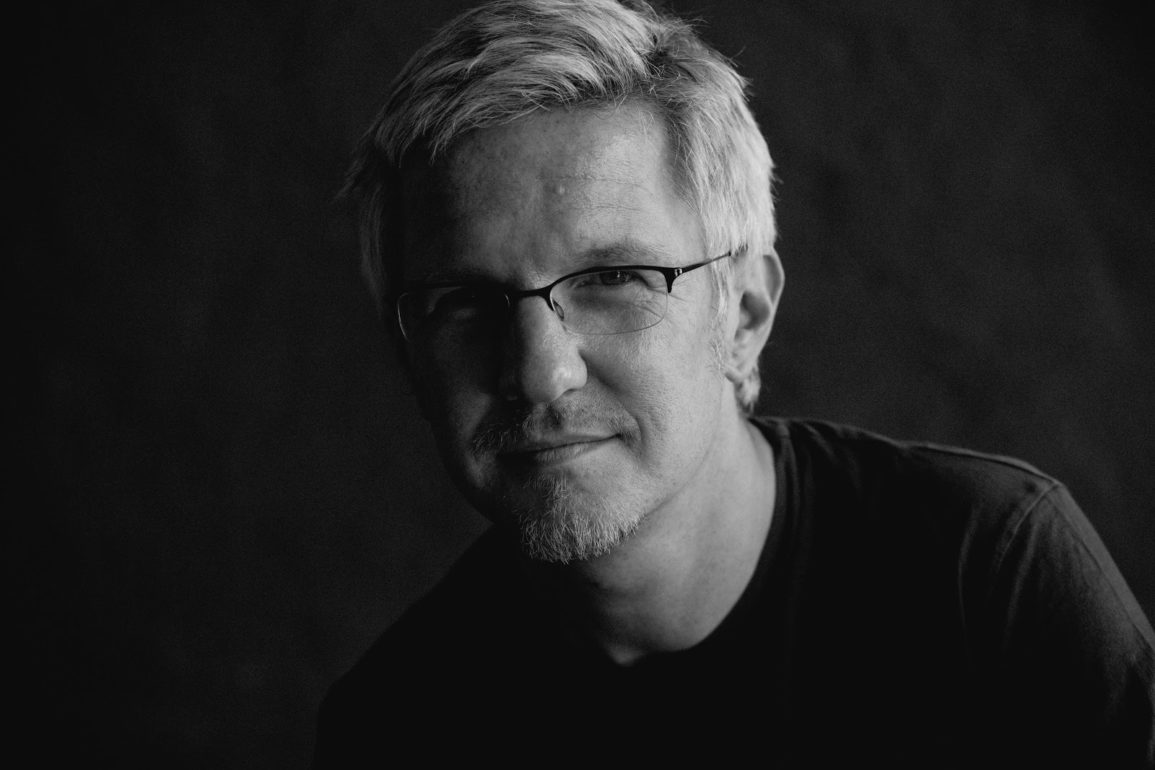Paul Haslinger was a member of the German electronic music legends Tangerine Dream between the years 1986-1990. Within just 5 years, he had performed in 15 albums with the band. Having been a prominent soundtrack composer over the years, he has made music of films and series such as Crank, Underworld: Awakening and Fear the Walking Dead.
His first solo album in over 20 years is titled Exit Ghost, and strikes the listener as a haunting and mysterious experience. We have reached out to Haslinger for an interview about the album and more.
Together we have dwelt upon a variety of topics like Exit Ghost, dreams, literature and Tangerine Dream. Hope you’ll enjoy.

First of all, let me congratulate you for your latest album. I really love Exit Ghost, i believe it is one of your finest achievements, if not the best.
Thank you.
I have read that Exit Ghost took you approximately 8 years to finish. Is that right?
Yeah, 8 years of expert work on it. And before, maybe 30 years of thinking about it.
Really? 30 years?
(Laughs) Well, you know, I always wanted to do a piano album, but I couldn’t figure out how to do it, so it took me a while.
So would you like to talk about the process? Like while you have been thinking about it, and then 8 years of recording, et cetera?
Sure. You know, piano was the instrument that I started with. I had classical training, like many kids, and I hated it. At some point, I just sat down on the piano and I started trying things and doing things that were actually fun for me. And that’s sort of how my piano playing started. The original point of introduction to music was the piano and it has been my main instrument ever since. As you know, piano is sort of the easiest instrument to play because you just have to sit down and get a key. Therefore, there is a lot of piano music and then figuring out what your voice is within this amount of piano music. That’s a task, because it’s quite easy to just play the piano. It’s more difficult to say, “How is this playing in any way personal, or is something unique to my style” or whatever you call it.
The more music you make -and with film music, I make a lot of music-, this question of what your musical roots and your musical center are becomes more important. In short, the story of Exit Ghost is to find where all this is coming from originally and connect that to where I am at now as a composer, and as a human who’s lived for a while on this planet.
Exit Ghost actually sounds like a dream to me, or a dream-like state. I just can’t help but wonder: Do you often dream? And if so, how much of those dreams go into the creation of music?
I think of dreams always as sort of connection that we don’t fully understand, or have to fully understand. When you’re in a dream, you don’t ask questions and you accept the irrational aspects of the dream. There’s a strong connection with music in that sense. I think good music also needs to be free of rational thought sometimes, and to be able to go into unexpected places. All things that are possible in dreams should be possible in music too. So I have considered it to be a very strong alliance between dreams and music. The fact that I played in a band that’s called Tangerine Dream and that’s just another pun…
Yeah, I love your work with Tangerine Dream, of course.
Thank you. So yeah, it all connects.
Exit Ghost, like I said, is like a dream, but to me, an epic dream. It has epic proportions, and -forgive me if I describe it a little wrong-, to me it has both subtle and grand touches melted into each other like an organism, and just moving freely across the room or whatever. One can easily tell you put delicate effort on it, and of course you have already said that you put years of work into it, so I already have my answer on that. (mutual laughs) My question is, do any of that music come out as an instinct? How much of it was planned and how much of it was an instinct? Is it balanced when you create it?
The way I go about music is in layers, in stages, it’s not like a sit-down and write a piece of music, and then it’s done. It usually starts with capturing something, capturing a piano performance, or capturing another sound. Then it has to go through these different layers of work on it, because the difference between working by yourself and working with a band is that, in a band, you always have somebody to give an opinion or a perspective. When you work by yourself, it’s your own job and that requires to let the music to sit for a while and then come back to it. You won’t be able to judge music at the moment when you write it, at least I don’t. At the moment, I think it’s a good idea, but two days, two weeks, or two months later, I come back to it and I have a different view. That’s just how I go about music.
With these new perspectives, often come new ideas on what to do with this original recording or how you could transform it, and transpose it. It’s very similar to the direction in art in the 20th century called assembly art, (made by artists like) Robert Rauschenberg, where different elements combine in different ways and you judge the effect of the combination. With music technology now, we can do the same thing. We can have 50 different ideas and bring them in the context of one composition. I just love doing that, even though sometimes it can lead you down to a road with too many options and too many ideas. But every cluster of ideas, at some point, finds its own point of gravity. You just follow wherever that bundle of ideas pulls you. Eventually, out of that, comes a finished piece. It’s a messy process. I haven’t found an efficient way of doing these and maybe there shouldn’t be one anyway.
It really sounds like an enjoyable journey.
Yeah, on occasion. Sometimes it’s enjoyable, sometimes it’s just suffering. (laughs)
I guess so, yeah. (laughs) Exit Ghost, in its background, has strong references to the John Fowles novel, The Magus. Can you elaborate on that connection? You read the novel, how does the book reflect the story of the album?
In the novel, there is a device used in the plot where a character gets told early on about a waiting room. It’s not explained what the waiting room is. Later on in the novel, -I’m giving a little away from the novel now- the waiting room gets explained as a metaphor of life: The fact that most people spend their life in the waiting room, and never make it to an actual presence. I really like that metaphor. For a long time, the album’s working title was actually The Waiting Room. I love reading books and being influenced by them. It’s a major point of influence. The novel’s set in Greece, and it’s about a character figuring out his own life. which seemed to be pretty much the topic of the album. You know, figuring out a position in life, however you’d describe that.
I guess I understand more or less. I actually started reading the novel 5 years ago, and I thought, “Well, this really needs to be digested later,” and never really continued. I guess I will now.
To give you the full story, though: There’s a book by Chris Kraus called After Kathy Acker. It’s about the relationship between these two women. In it, she describes this conversation with Kathy Acker in which she mentions the novel The Magus. For reasons that she herself didn’t understand, she was fascinated by the book. This was what originally triggered me to read the book. Life is often these chain reactions of coincidences. If I hadn’t read the book, I wouldn’t have read The Magus, and the album would have turned out differently. It’s all a chain of coincidence.
That partly answers my next question. Let me ask it briefly anyway: What are your other inspirations in literature? The top ones, the ones that first come to your mind…
Because I read too much literature, I’m always bound to leave out a lot of them. I’m reading a French novel at the moment. It’s called Vernon Subutex 1…
Oh, I haven’t heard of that.
…and I don’t want to butcher the name of the author. (Virginie Despentes -ed.) We should get an email contact so I can email you some of these names.
I would be glad, thank you.
What else have I read recently? I’m always so consumed by the book I’m reading right now that I forget the others before. Over time, there’s been certain writers that I had a resonance with. Haruki Murakami is somebody that I have read almost all his books, and he tends to be a major source of inspiration. There’s a guy David Mitchel, he wrote Cloud Atlas, his most famous one. A lot of these authors write in non-linear narratives, I compare that to the messy aspect of making music. Their stories feel current, they feel like they they’re reflecting life as it is now, not as it was a hundred years ago. I’m usually inspired by people and writers that seem to hit a nerve with how I perceive reality right now, which is not very classical. It’s a different time, and it’s good to read, hear or see something that feels like this current time.

You’re also well known with your movie scores. How many soundtrack albums do you approximately have? So many, right?
Yeah, maybe too many. (laughs)
What pleasures can someone get by scoring movies? Is it as enlightening as making Exit Ghost?
It’s a wonderful job. I love doing this kind of work. I get bored quickly and it always takes me to different corners. It’s not like having a music career and having to stuck with one sound in film and TV. You can go wherever the project wants to go. In terms of having more adventure or more spectrum in your musical life, it’s quite wonderful. It’s also wonderful to be in the service of a project, to not have to put your ego into it and just say “No, this is not about the composer, it’s about making the movie or the show better.” I love all of these aspects.
Having said that, I’ve been writing almost exclusively film scores for 20 years or so, and after a while there is the danger to lose your musical self a little bit because you’re always in the service of these projects. That was certainly a motivation for Exit Ghost. Every once in a while, you want to express something that is not directed towards a film plot or a television show. You want to shine the flash light to somewhere else. I think that’s important and necessary to sometimes be free of these cause-and effect relationships that you have with any job. When someone says, “I’ll give you money, now write some music,” you’re not free at that point. You’re in the service of a project. Doing your own music, you keep yourself the chance to be free of these strings and just say “I can go wherever that takes me.”
I have a couple of more questions. Firstly, you have another current project called The Neuland Project. Did I pronounce that correctly?
Yes, pretty close.
The project is with Peter Baumann, which is interesting. He’s, such as yourself, an ex-Tangerine Dream member. How did that partnership develop? Because you weren’t in the band together at the same time…
We weren’t in the band together, but in the 80’s, Tangerine Dream was signed to Peter Baumann’s label, Private Music. I met Peter as my label boss, basically, he was the head of Private Music, and obviously a former Tangerine Dream member. That’s how we first met. We both live on the West Coast. He used to live in Los Angeles, he’s now in San Francisco, I’m still in Los Angeles. We kept in contact over the years and we always enjoy each other’s company, we’re both musicians… It’s all natural. Every once in a while, we want to make music together. We did it once: In the early 90’s, we did a project called Blue Room that wasn’t (officially) released and we did it again a few years ago. It’s just fun making music together. We have this common background of different periods in Tangerine Dream. It’s similar to Exit Ghost, there is an aspect of past in it and also the future, where you want to take it, what you think is possible or should be possible in electronic music. It was a natural process that led to this project.
I’m sure it will go to great places. I want to ask this as a closing note: Peter and you were, as we said before, were never actually in Tangerine Dream together. Do you tell each other crazy stories from those days and amuse each other? If so, can you tell me one?
(Laughs) I think it goes beyond anecdotes, because you reflect on that time and there’s a large story of Tangerine Dream. Why did Tangerine Dream and a handful of other German bands have the success they did? I think there was a lot of coincidence, too. But the fact is, this group musicians, Kraftwerk, Tangerine Dream, Can… They triggered a lot of things. I don’t know if you saw the recent documentary about Conny Plank. It’s called Conny Plank: The Potential of Noise.
No, but I’ll definitely check it out.
Conny died when his son was 13, so his son trying to figuring out the biography of his father, and they’ve made a documentary out of it. It’s interesting because he didn’t really know his father. He was always in the studio making records. It’s a little bit like that when Peter and I talk about Tangerine Dream, because there was so much going on at the time that you didn’t really process.
I’m still trying to think of a funny story for you that you could use. (mutual laughs) I can tell you one. I think it was 1988, we were doing a North American tour and were playing in Quebec city in an open air arena. It’s pretty far north, so even though it was summer, it could get pretty cold at night. The concert, of course, was in the evening. We were playing, and in the middle of the show was this piece where both Edgar (Froese) and I were playing guitars, and before that piece, our third band member at the time, Ralf Wadephul was playing a piano solo. He would play the piano solo, we would get ready with the guitars and once he finished the solo we would step in. Only in that evening, it was super super cold, so by the time we got to the piano solo, Edgar’s and my hands were frozen. So we ran backstage while Ralf was playing, and just got our hands into some hot water to just defrost our hands for the guitar parts. Of course we hadn’t told Ralf about that, so the poor guy found himself alone on the stage in front of 5,000 people, playing a piano solo that he didn’t know how long it would last until we came back onstage. (laughs)
So he just kept going… (laughs)
Yes. So those are things that happen to you on tour sometimes.
I think that’s about all of my questions for you, Paul. Thanks so much for doing this interview with me.
You’re more than welcome.



